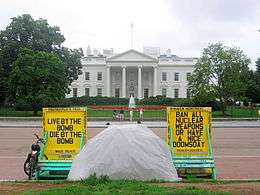Live by the sword, die by the sword
"Live by the sword, die by the sword" is a proverb in the form of a parallel phrase, which can be traced back to Aeschylus's Agamemnon, line 1558, "By the sword you did your work, and by the sword you die."[1] Agamemnon was part of the Oresteia, trilogy of tragic dramas by the ancient Greek dramatist and was first performed in 458 BCE
The saying appears in the Latin Bible in the Gospel of Matthew, chapter 26, verse 52,[2] an unnamed follower of Jesus draws his sword and cuts off the ear of a servant of the high priest. Jesus then says to him: Converte gladium tuum in locum suum. Omnes enim, qui acceperint gladium, gladio peribunt. ("Return your sword to its place, for all who will take up the sword, will die by the sword.")
Interpretations
While a common modern interpretation[3] means "those who live by violence will die by violence", suggesting nonviolence or pacifism as an alternative, it is also used for a variety of situations which contain an element of poetic justice and karma.[4]
The Biblical quotation has been interpreted as an instruction for Christian pacifism.[5]
References in popular culture

The saying is paraphrased in the slogan "live by the bomb, die by the bomb" used in The White House Peace Vigil protest.
Slayer song Die by the sword appears on the Show No Mercy album released in 1983.
Jamestown Story song, "if you live by the sword, you die by the sword" appears on the 2011 album, A Walk Through Time.
The Saxon song To Live By the Sword appears on the Lionheart album released in 2004.
Oasis song Magic Pie: They who don't say what they mean, Will live and die by their own sword.
Lil Wayne song 'God Bless Amerika' - "And we live by the sword, and die by the sword"
See also
References
- ↑ http://genius.com/Aeschylus-agamamnon-lines-1509-1558-annotated
- ↑ http://www.latinvulgate.com/lv/verse.aspx?t=1&b=1&c=26
- ↑ "Idiom definition at www.usingenglish.com".
- ↑ Weinstein, Marion, Positive Magic: Ancient Metaphysical Techniques for Modern Lives, retrieved October 27, 2015
- ↑ John David Geib (2007). Gail M. Presbey, ed. Philosophical Perspectives on the 'War on Terrorism'. p. 401.
War and Peace in Christian Tradition: Why I am an engaged Christian pacifist